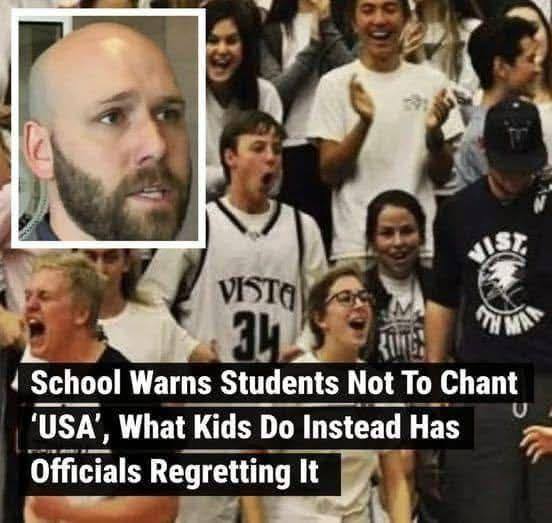A high school in Folsom, California has sparked widespread debate after students were told they should refrain from chanting “USA” during sporting events and rallies. At Vista Del Lago High School, the chant had long been a spirited tradition, often echoing through gymnasiums and stadiums as students rallied behind their teams. For many, it wasn’t just a chant—it was a proud expression of unity, school spirit, and national pride. But when school officials stepped in and advised students to hold back on shouting “USA,” emotions quickly flared.
The decision came during a leadership class, where staff raised concerns about how the chant might be perceived. According to school officials, the aim wasn’t to suppress patriotism but to encourage mindfulness. In some schools across the nation, similar chants have reportedly been used in ways that made students of different backgrounds feel singled out or excluded. At Vista Del Lago, administrators wanted to ensure that everyone felt safe and respected—especially in a diverse school community.
Daniel Thigpen, Communications Director for the Folsom Cordova Unified School District, emphasized that the message was about balance. “To practice empathy, to practice kindness, and to practice patriotism—you can do both,” he explained. The idea was not to ban the chant entirely, but to reflect on when and how it’s used, especially in contexts where it could be misunderstood or misused.
Still, many students were left confused. “I wasn’t angry,” said senior Ryan Bernal, “but I was definitely like, ‘Why can’t we chant USA?’” For Ryan, and others like him, the chant was never meant to hurt anyone—it was a celebration of what they believed united them all. “To say USA, you know, we’re all the same. We’re all American. It doesn’t matter what your skin tone is or where you’re from.”
His words reflected a broader sentiment among many of his classmates who felt that the school’s caution, though well-intentioned, might have gone too far. Some wondered whether overcorrection was blurring the line between protecting feelings and stifling expression. Others saw it as an opportunity to open a deeper dialogue about how patriotism and inclusion can coexist.
Mike Garrison of the California Interscholastic Federation weighed in, saying, “There’s a time and a place to yell that and cheer that.” His comments underscored the idea that context matters, and that even something as seemingly simple as a chant can carry weight depending on when and where it’s used.
The situation at Vista Del Lago has since ignited passionate conversations far beyond the school’s walls. Parents, students, and community members continue to debate whether the decision was a necessary step toward empathy or a misguided overreach. In a time where national identity and individual experience often collide, this high school has found itself at the heart of a larger cultural conversation—one that challenges us all to ask: how do we show pride without exclusion? And how do we teach the next generation that patriotism, like kindness, should unite, not divide?
